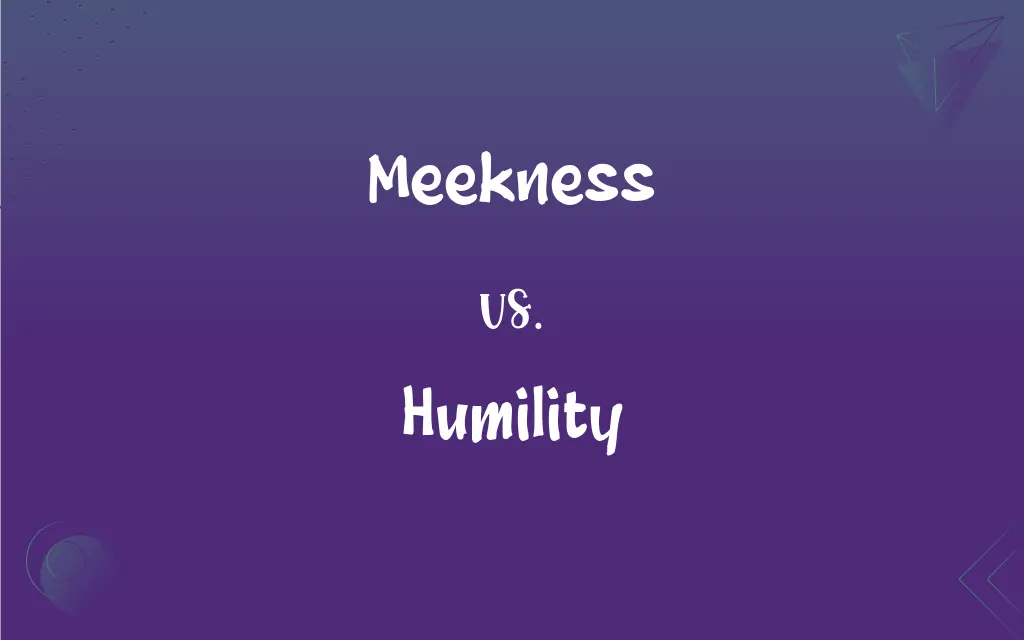Meekness vs. Humility: What's the Difference?
By Janet White & Harlon Moss || Published on March 6, 2024
Meekness involves gentleness and patience under provocation, while humility is the recognition of one's limitations and the respect for others' worth, showcasing their nuanced expressions in character.

Key Differences
Meekness is a trait characterized by gentle patience, especially in the face of provocation or injustice, without resorting to aggression or retaliation. It reflects inner strength and self-control. Humility, on the other hand, involves a realistic self-view, acknowledging one's flaws and limitations, and valuing others equally without seeking superiority. While meek individuals may exhibit humility, humility doesn't necessarily imply meek behavior, especially in situations requiring assertive action for justice or defense.
Meekness often manifests in a calm demeanor and a refusal to assert oneself aggressively, even when wronged, embodying a form of moral courage. Humility, however, encourages a person to defer accolades, share credit, and elevate others, stemming from a place of self-assurance and a well-grounded sense of self-worth. It's about knowing one's place in the larger scheme of things and acting with respect towards all.
In conflicts, a meek person might choose to endure silently or respond with kindness to defuse situations, prioritizing peace over proving a point. A humble person, while possibly standing up for themselves or others, would do so without diminishing others, recognizing the shared humanity in all parties involved.
Meekness is sometimes misunderstood as weakness or passivity, but it's actually a controlled choice not to exert one's power in retaliation. Humility, conversely, is often seen as a lack of confidence, but it's genuinely about acknowledging that one doesn't have all the answers and that every person has intrinsic value.
Both meekness and humility are valued in many philosophical and religious traditions as virtues that foster peace, understanding, and respect in interpersonal relations, each contributing uniquely to the moral fabric of society.
ADVERTISEMENT
Comparison Chart
Definition
Gentle patience in the face of provocation
Recognition of one's limitations and others' worth
Key Characteristics
Self-control, gentleness, non-retaliation
Self-awareness, modesty, respect for others
Behavior in Conflict
Tends to endure or respond with kindness
May stand up for self/others but without arrogance
Common Misconceptions
Seen as weakness or passivity
Often mistaken for lack of confidence
Role in Relationships
Promotes peace and avoids unnecessary confrontation
Fosters equality and mutual respect
ADVERTISEMENT
Meekness and Humility Definitions
Meekness
It's about strength under control.
Her meekness in the face of adversity was admirable.
Humility
Humble people don't seek the spotlight.
Despite his success, he remained humble.
Meekness
Meekness is showing patience without anger.
He responded with meekness to the unfair criticism.
Humility
Humility means knowing your limitations.
She accepted the award with humility, acknowledging her team's effort.
Meekness
Meekness is not about weakness but choice.
Choosing meekness, he forgave his adversary.
Humility
It involves valuing others equally.
His humility was evident when he praised his competitor's work.
Meekness
It involves enduring patiently.
Meekness guided her decision not to retaliate.
Humility
It's about being grounded and realistic.
Her humility kept her focused on continuous improvement.
Meekness
Meek individuals avoid escalating conflicts.
Despite the provocation, he remained meek.
Humility
Humility allows for growth and learning.
His humility made him a lifelong learner.
Meekness
Showing patience and humility; gentle.
Humility
The quality or condition of being humble.
Meekness
Easily imposed on; submissive.
Humility
The characteristic of being humble; humbleness in character and behavior.
Meekness
The state or quality of being meek.
Humility
The state or quality of being humble; freedom from pride and arrogance; lowliness of mind; a modest estimate of one's own worth; a sense of one's own unworthiness through imperfection and sinfulness; self-abasement; humbleness.
Serving the Lord with all humility of mind.
Meekness
The quality or state of being meek.
Humility
An act of submission or courtesy.
With these humilities they satisfied the young king.
Meekness
The feeling of patient submissive humbleness
Humility
A disposition to be humble; a lack of false pride;
Not everyone regards humility as a virtue
Meekness
A disposition to be patient and long suffering
Humility
A humble feeling;
He was filled with humility at the sight of the Pope
FAQs
Is humility a prerequisite for meekness?
While humility often accompanies meekness, it's not a strict prerequisite. One can practice meekness as a strategic or moral choice independently of their sense of humility.
How does meekness benefit personal relationships?
Meekness can prevent unnecessary conflicts and promote harmony by prioritizing peace over proving oneself right, which strengthens relationships.
Can a person be meek but not humble?
Yes, a person can exhibit meekness, such as patience and gentleness, without necessarily being humble regarding their achievements or status.
How do meekness and humility impact leadership?
Leaders who embody meekness and humility are often more respected and can inspire loyalty, as they lead by example, showing strength in restraint and valuing others' contributions.
Can meekness be misconstrued in professional settings?
In competitive professional environments, meekness might be misunderstood as a lack of assertiveness or ambition, potentially impacting career progression.
Can humility be detrimental in competitive environments?
While excessive self-deprecation can be unhelpful, true humility, which includes a clear understanding of one's strengths, can actually be an asset by fostering teamwork and adaptability.
Do meekness and humility affect conflict resolution?
Yes, meekness can lead to non-confrontational conflict resolution, emphasizing peace over winning, while humility allows for acknowledging one's own role in conflicts, facilitating resolution.
How do different cultures view meekness and humility?
Cultural perceptions vary widely; some cultures highly value these traits as signs of wisdom and strength, while others may prioritize assertiveness and self-promotion.
Can meekness be a strategic choice?
Absolutely, meekness can be strategically chosen to de-escalate situations, preserve relationships, or for moral or religious reasons, rather than from a lack of courage or strength.
Can a leader be both meek and effective?
Yes, a meek leader can be highly effective by leading through example, using soft power, and inspiring respect and loyalty through their gentle and patient approach.
How do meekness and humility influence social interactions?
These traits can positively impact social interactions by reducing ego clashes, promoting understanding and respect, and enhancing the quality of relationships.
Is it possible to develop meekness and humility?
Yes, both traits can be cultivated through self-reflection, mindfulness, and a conscious commitment to valuing others and responding to situations with patience and respect.
How do religious teachings influence perceptions of meekness and humility?
Many religious traditions extol meekness and humility as virtues, associating them with spiritual maturity, moral integrity, and closeness to the divine, which can deeply influence followers' values and behavior.
What is the role of meekness in negotiations?
Meekness in negotiations can help in maintaining a calm and cooperative atmosphere, potentially leading to more amicable and sustainable agreements.
How can humility contribute to lifelong learning?
Humility, by acknowledging that one doesn't have all the answers, fosters an openness to new experiences and knowledge, driving continuous personal and professional growth.
Are there any downsides to being too meek or humble?
Excessive meekness can lead to being overlooked or mistreated, while excessive humility might result in undervaluing one's own contributions or abilities.
How do meekness and humility influence societal dynamics?
Societies that value meekness and humility tend to promote peace, cooperation, and mutual respect, contributing to more harmonious community relations.
Is humility valued in all professional fields?
While generally seen as a virtue, the value placed on humility can vary by field, with some industries emphasizing individual achievement and others prioritizing collaboration and team success.
What challenges might meek or humble individuals face in self-promotion?
They might struggle with self-promotion due to their reluctance to assert their achievements or capabilities, potentially hindering their visibility and opportunities in environments that reward self-advocacy.
How do meekness and humility relate to empathy?
Both traits can enhance empathy, as meek individuals may be more attuned to others' feelings due to their gentleness, and humble individuals may be more open to understanding others' perspectives.
About Author
Written by
Janet WhiteJanet White has been an esteemed writer and blogger for Difference Wiki. Holding a Master's degree in Science and Medical Journalism from the prestigious Boston University, she has consistently demonstrated her expertise and passion for her field. When she's not immersed in her work, Janet relishes her time exercising, delving into a good book, and cherishing moments with friends and family.
Co-written by
Harlon MossHarlon is a seasoned quality moderator and accomplished content writer for Difference Wiki. An alumnus of the prestigious University of California, he earned his degree in Computer Science. Leveraging his academic background, Harlon brings a meticulous and informed perspective to his work, ensuring content accuracy and excellence.































































